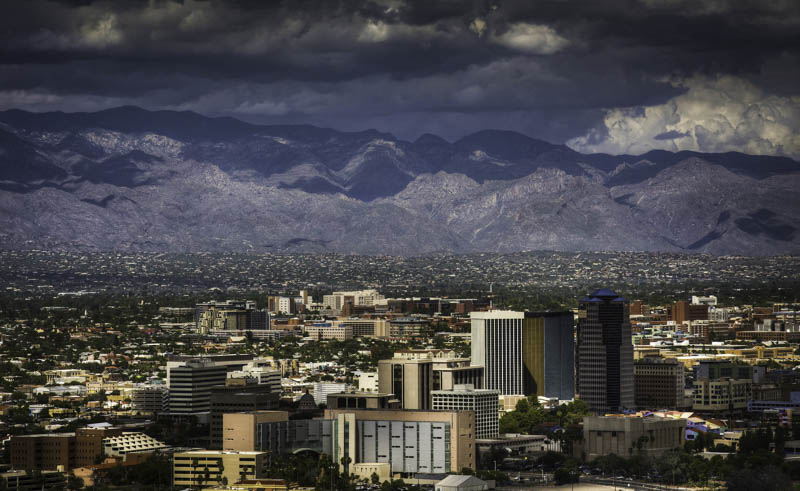Besides being famous for the stunning and breathtaking Sonoran Desert that covers this region, Tucson is also recognized by the United Nations Educational, Scientific, and Cultural Organization (UNESCO) as a World City of Gastronomy — in fact, it is the first city to be named as one. Its vast selection of the finest, unique, and outstanding restaurants is sprawled all over the city, along with its rich visual and performing arts scene.
The city continues to be the second most populated city in Arizona, right after Phoenix, and is home to over one million residents in the metropolitan area. Although it’s not one of the fastest-growing in the state, its population increased to 1.59% and is projected to progressively increase by 1% annually. Its job market is also expanding and is forecasted to grow by 3.4% next year, according to the University of Arizona Economic and Business Research Center (EBRC).
Tucson’s laid-back atmosphere, scenic views, and ample job opportunities leave tourists wanting more, sometimes convincing them to relocate. Before relocating, however, future residents must first secure a home. Some opt for rental, some for buying, and some for home construction. To help those who chose the latter or just want to know more, we have listed the construction costs and various aspects to be considered before building a home in Tucson.

The Cost of Building a Custom Home in Tucson
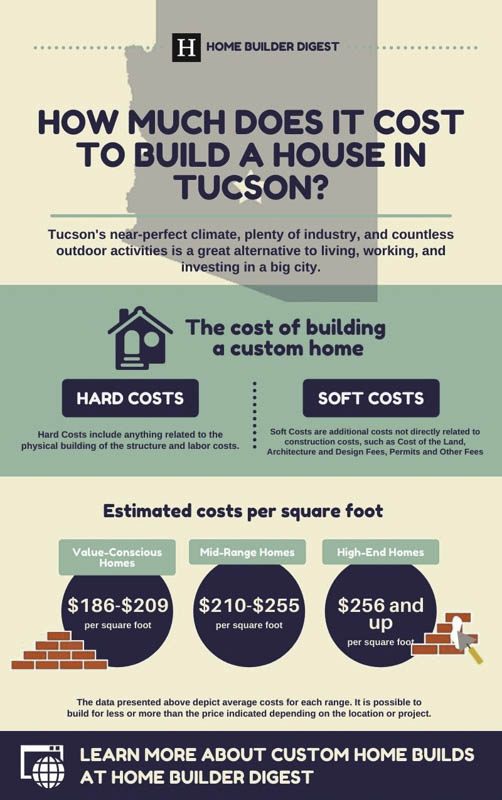
Although it may look like buying a house is easier, buying doesn’t guarantee that you will tick off everything on your checklist. Building your own custom home is a way to ensure that you can personalize your home the way you want to and how to best fit your family’s needs. You can set a budget and focus on incorporating your wants and needs into your future dream home. This will help you strictly follow that budget and not worry about exceeding it.
The National Association of Home Builders (NAHB) estimated that it will cost $296,652 to build a new single family home in the country. To put the values in square footage, value-conscious homes typically range from $100-$200 per square foot, and luxury homes cost $200-$500 per square foot. The price varies depending on customization, complexity, level of finish, and location.
In Tucson, the median price to build a home is around $210 per square foot. More specifically, value-conscious homes cost $186 to $209 per square foot, mid-range homes cost $210-$255 per square foot, and high-end homes cost $256 and more, respectively. The overall home value will land you at approximately $372,000 to $512,000+ for a 2,000-square-foot home.
Suppose you’re also interested in building your dream home in the city. Keep in mind that the values given above are only estimates. Before you get a definitive answer on how much it costs to build a house in Tucson, more factors need to be considered besides the ones mentioned above. We have divided them into two separate categories: hard and soft costs.
Hard Costs
Get a free cost estimate
Hard costs refer to the physical building of the home, including the actual home construction, materials, labor, and landscaping. Electrical, plumbing, HVAC, and roofing are also included in this category, along with other home additions or extra amenities.
The average cost to build a custom home in Tucson starts at $95 per square foot but may quickly rise up to $148 per square foot depending on the size, complexity, difficulty of site, and level of finish. This puts the total basic construction cost between $190,000 to $296,000 for a 2,000-square-foot home — excluding excavations, basement finishing, site developments, and landscaping. With the labor fees included, the value may increase to $290 per square foot, pushing the total construction cost to $580,000.
Roofing
Roofing is also excluded in the estimates above. The typical cost for a roof in Tucson is approximately $7,500. This value may increase or decrease, and the most significant contributor to that is the materials used. Although asphalt shingles are the most commonly used and possibly the cheapest roofing material, it’s not ideal in places with hot climates like Tucson. Metal roofing is a great alternative and is typically priced at $7-$9 per square foot. If you include the labor costs on this, around $1,440 for a three, six-hour workday, the total roofing cost will be around $15,440 to $19,440 for a 2,000-square-foot home.
HVAC, Electrical, and Plumbing
To keep a home functional and safe, a future homeowner must install the main home systems: HVAC, Electrical, and Plumbing.
Heating, ventilation, and air conditioning (HVAC) provide heating and cooling to your home to keep it comfortable while maintaining high indoor air quality. This is one of the most complicated systems in your home, yet an essential one. With Arizona’s blazing summer, air-conditioning is a must. A central AC unit in Tucson typically ranges from $6,319 to $11,590, with the size, SEER rating (efficiency), warranty length, and HVAC contractor directly affecting it. The AC unit alone costs $3,412, which is the best for a 2,000-square-foot home. A qualified technician is also needed to install the system, and their labor fees range between $90-$150 per hour. Keep in mind that this will also greatly contribute to the utility bills. According to news site AZCentral, Arizona has the highest utility costs at $477 per month — three times more than the national average.
On the other hand, electrical and plumbing are pretty basic compared to the HVAC but still require attention and meticulousness. According to HomeAdvisor, installing electrical wirings in Tucson typically costs $363 to $1,256, and plumbing installation costs $306 to $2,171. The final value will depend on the materials and the labor fees. Electrician fees cost $40-$100 per hour, and plumber fees cost $97-$125 per hour, including parts and materials.
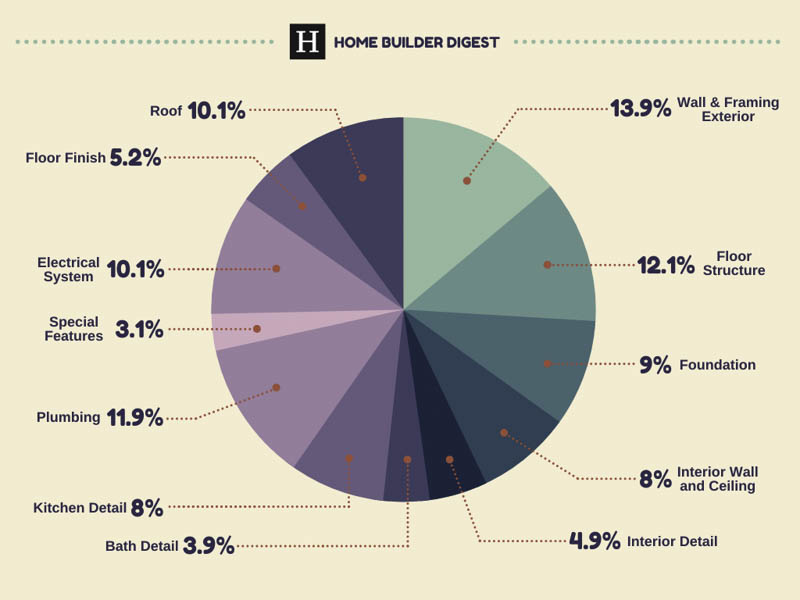
Figure 1. Typical cost breakdown of a single-family home constructed using the conventional method, according to Home Builder Digest.
Soft Costs
Get a free cost estimate
Soft costs are expenses that go beyond the actual building of the structure itself. Usually, these are settled pre- and post-construction. These fees are related to developing the land, those imposed by the city for building projects, as well as those related to design.
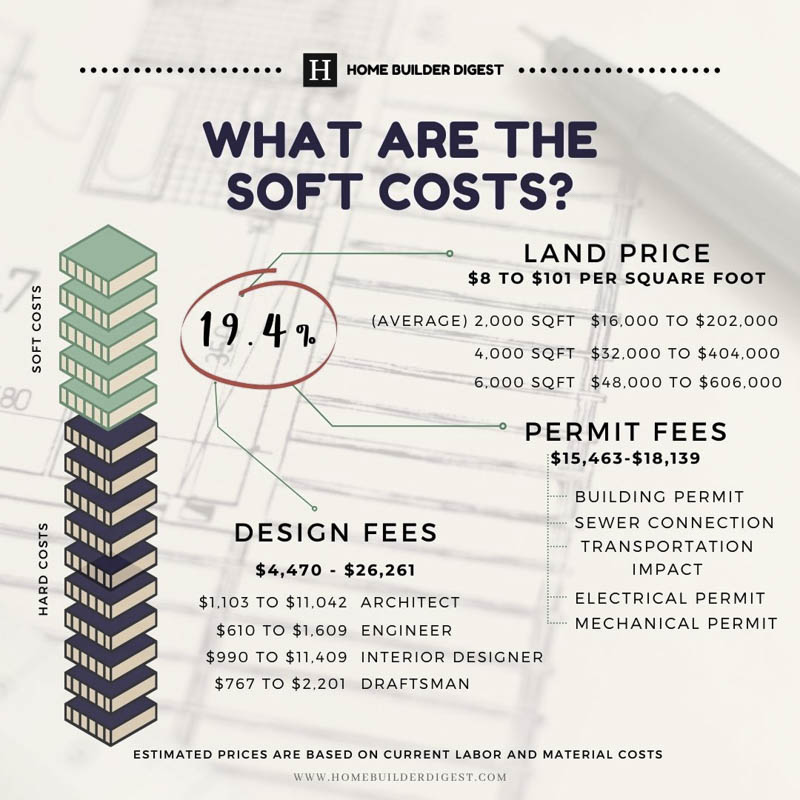
Figure 2. Soft cost percentage and average price range of additional fees, determined from the overall cost of custom home building in Tucson.
Cost of the Land
Usually, rural states have lower land prices compared to heavily urban and suburban states. Arizona is among the top ten states with the lowest price per acre, and land costs $4,328 per acre — approximately $10 per square foot.
According to recent listings in real estate site Redfin, the average land size available in Tucson is 1.6 acres or approximately 70,000 square feet. In terms of cost, the average listing price is $215,665, or more specifically, $16.92 per square foot.
When deciding the lot size, consider the size of your actual home and the extra areas for your backyard, garage, outdoor living space, and other additional amenities. According to the Phoenix Biz Journals, the median backyard size in Tucson is 7,536 square feet. That, plus the typical home size in the country, which is around 2,000 square feet, will bring you a total of 9,536 square feet. Your total land costs will land at approximately $161,350.
Keep in mind that the price of land varies depending on the location. In Tucson, land costs increase as you get closer to Central and Downtown. Additionally, buying lots from the city’s affluent neighborhoods—Catalina Foothills, Sam Hughes, and El Conquistador—will be more pricey. The typical reason behind this is the neighborhood’s proximity and access to various establishments, such as schools, groceries, shopping centers, job hubs, as well as the crime and safety ratings.
Permits and Other Fees
Despite the pandemic wreaking havoc worldwide and directly affecting various industries including construction, the industry is now showing signs of recovery. According to the Tucson-Southern Arizona Housing Market Letter year-end report, approximately 4,336 new home permits were issued by the end of 2020 alone.
Requirements for Tucson’s building permits can be reviewed at the city government’s website. For homes within Pima County, property owners, architects, and licensed contractors can also submit online or personally go to The Building and Site Development Division located on the first floor of the Public Works Building.
According to the Pima County Development Services’ permit fee calculator, the estimated price of building and zoning permits for new construction is $3,915-$6,589. This value is for 2,000 square feet and 4,000 square feet of livable areas, excluding the garage, porches, and other accessory structures. The total permit cost will rise to $4,384-$7,058 once a two-car garage is added, typically around 480 square feet.
Aside from the building permit fees, payment for sewer connection permits and transportation impact permits are also needed in every new home construction. The estimated cost for sewer connection is around $4,188, while the transportation impact fees for single family detached homes is $6,893.
The total permit fee is between $15,463 to $18,139. Though it seems pricey, it is necessary. The fee ensures homes are up to the standards enforced by local authorities to safeguard public health, safety, and general welfare.
Architecture and Design Fees
Before making final decisions, you have to devise a thorough plan to follow. Without one, there is no guarantee that your home will be completed the way you want it to be. Architects help you in this aspect as they develop the design and guides that are ideal for you and your home.
Some architects charge on an hourly rate or a percentage of the project’s overall costs. The average cost to hire an architect is $50-$150 per hour, or around 5-15% of the project cost—$37,500-$112,500 for a $750,000 custom-built home. For Tucson specifically, architecture and design fees typically cost $1,103 to $11,042, as reported by Manta. Experienced and highly acclaimed architects charge more than the others, depending on their expertise. Though it may take a big chunk from your budget, keeping your home safe yet functional and beautiful is a good investment. You can negotiate a deal with the architect to have a flat fee, but take note that it will still depend on the scope of work. Total architecture and design fees will increase in every additional task, and other project-related expenses may be charged to you.

How do the custom home building costs in Tucson compare to other nearby cities?
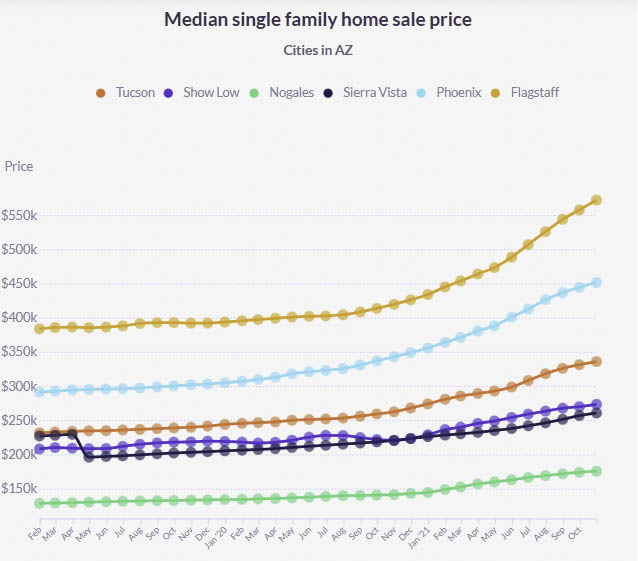
Figure 3. Comparison of the median home sale price for single-family homes between various major cities in Arizona, as reported by Zillow and Arizona Daily Star’s online news platform tucson.com.
The west coast is the largest region in the U.S., and the average cost to build a home here is around $158.73 per square foot. Business Insider reported the median listing price per square foot of each state, and Hawaii is the most expensive state in the region and in the country with $521 per square foot. Arizona is 224% cheaper than Hawaii with $161 per square foot, making it the second most affordable state in the region — followed by New Mexico with $137.
In terms of major cities in the state, building construction costs in Tucson are not that far from the capital city of Phoenix’s price range. According to the online contractor platform Buildzoom (BZ), homes in Phoenix range from $164-$316 per square foot, while homes in Tucson range from $186-$256. Both cities experienced a surge in home values compared to last year’s, with Phoenix increasing by 32.5% and Tucson by 29.5%.
Further comparing Tucson with other major cities in Arizona, we reviewed the building permits of recently built single-family dwelling homes through BuildZoom (BZ). Listed below are the values for each city, as well as the rate of increase/decrease, according to Zillow’s reports:
- Chandler: $148 to $269 per square foot, 29.6% increase
- Mesa: $143 to $248 per square foot, 31.8% increase
- Scottsdale: $139 to $230 per square foot, 32% increase
- Gilbert: $167 to $289 per square foot, 32.3% increase
- Glendale: $122 to $254 per square foot, 33% increase
- Peoria: $128 to $231 per square foot, 33.4% increase
- Tempe: $177 to $546 per square foot, 28.9% increase
What Leading Custom Home Builders and Architects that Serve the Tucson Area Say
Get a free cost estimate
We have reached out to some of the best construction and architectural firms that serve Tucson to get their insights regarding the city’s construction industry. They were also asked to share the price range for the services they offer to help confirm the values given above.
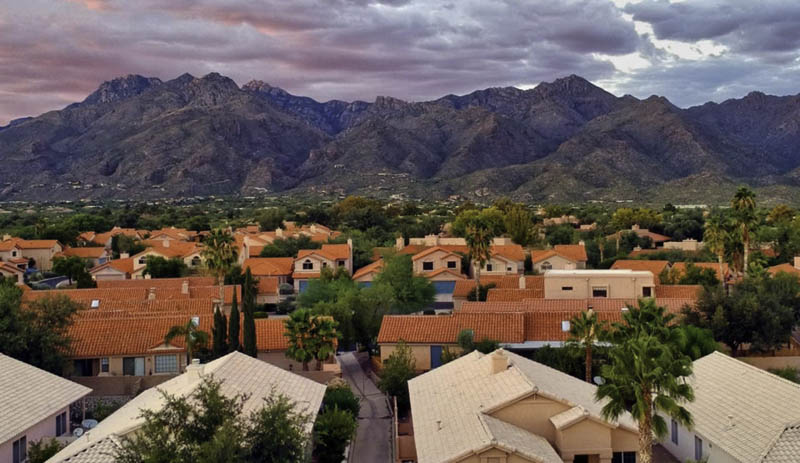
According to Bill Ford, principal architect of William L. Ford, Architects, and Associates (WLFA & Associates), Tucson’s construction costs are 10%-20% less than most cities in the country despite the recent price surges in building materials. Prices of steel fluctuated the most, wherein some of its variety increased as much as 400%, including carbon steel, open web steel joists, and stainless steel. With China’s temporary cutbacks, the COVID-19 pandemic, damaged supply chain, lack of labor resources, and inflation, Bill can only dub this “the perfect storm” to hit the industry. He foresees that the cost trends will continue to rise by 10% throughout 2022 but will eventually balance out by 2023. While Bill primarily works on mid-range to high-range homes, he estimated that his mid-range home projects are worth $200-$300 per square foot, and high-range homes are priced at $300 per square foot and up. Low-range or value-conscious homes cost around $150-$200 per square foot and are commonly seen with developers.
The Future of Tucson’s Residential Construction Industry
Over 50% of the city’s housing units are single family homes. Others are large apartment complexes, row houses, duplexes, and small apartments. The homes shelter approximately one million residents and are still growing annually. Tucson’s affordability attracts people from other major cities, like Los Angeles and San Diego, and its current residents are taking advantage of it.
The city of Tucson is not only bracing itself for the influx of new Tucson residents, but it is also anticipating the return of students as the universities start opening up again. The University of Arizona alone will welcome more than 45,000 students, and in turn, will provide a steady supply of renters. The city’s current residents are now taking advantage of the real estate market’s affordable housing stock to turn it into rental properties. With the pandemic and ongoing bidding wars between buyers, the inventory remains limited. With limited housing inventory, builders and developers are working hard to solve this.
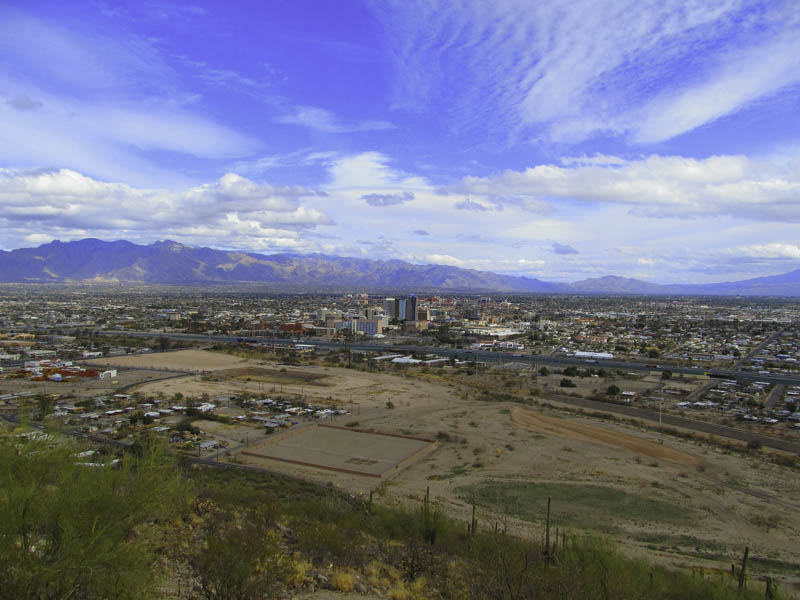
Tucson is also not safe from the supply chain issues the country is experiencing today. The NAHB reported that this is the worst building material shortage since 1990, thus pushing the prices even higher. According to the US Bureau of Labor Statistics, lumber and steel prices rose by 86% and 67%, respectively. Not only that, but this issue also resulted in delays in projects as getting materials delivered will take months. Over 93% of contractors are experiencing a shortage of at least one material, as reported by the US Chamber Commercial Construction Index for the 3rd quarter of 2021. The most common materials lacking are wood or lumber.
With the limited housing inventory and ongoing supply chain issues, Zillow predicts a 17.7% increase in Tucson’s home values by 2022. This rate is expected to progressively increase year after year. The Commercial Construction Index (CCI) is a quarterly economic index that gauges confidence in the commercial construction industry, and the city’s score rose by three points, which is a sign that the industry is improving. Unfortunately, it still remains below pre-pandemic ratings.
As the world recovers from the pandemic, future homeowners need to keep in mind the uncertainty of the real estate market. Although homes in Tucson are relatively cheaper than most major cities in the country, prices of homes and home building materials will remain unstable indefinitely. To avoid major budgetary concerns, consider the factors mentioned above and make an expert decision to find the most cost-effective approach to building for you.
Considering building a home in Tucson?
Contact us for a free consultation

